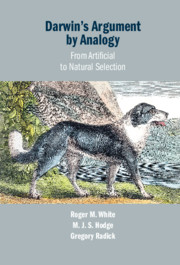Book contents
- Darwin’s Argument by Analogy
- Additional material
- Darwin’s Argument by Analogy
- Copyright page
- Contents
- Preface
- Introduction
- Chapter 1 Analogy in Classical Greece
- Chapter 2 Analogy in the Background to the Origin
- Chapter 3 Darwin’s Analogical Theorising before the Origin
- Chapter 4 The ‘One Long Argument’ of the Origin
- Chapter 5 An Analysis of Darwin’s Argument by Analogy
- Chapter 6 Darwin’s Use of Metaphor in the Origin
- Chapter 7 Rebuttals of the Revisionists
- Chapter 8 Wider Issues Concerning Darwinian Science
- References
- Index
Chapter 7 - Rebuttals of the Revisionists
Published online by Cambridge University Press: 21 October 2021
- Darwin’s Argument by Analogy
- Additional material
- Darwin’s Argument by Analogy
- Copyright page
- Contents
- Preface
- Introduction
- Chapter 1 Analogy in Classical Greece
- Chapter 2 Analogy in the Background to the Origin
- Chapter 3 Darwin’s Analogical Theorising before the Origin
- Chapter 4 The ‘One Long Argument’ of the Origin
- Chapter 5 An Analysis of Darwin’s Argument by Analogy
- Chapter 6 Darwin’s Use of Metaphor in the Origin
- Chapter 7 Rebuttals of the Revisionists
- Chapter 8 Wider Issues Concerning Darwinian Science
- References
- Index
Summary
Our task here is to address four authors who have given different accounts of Darwin’s argument from ours: Richard A. Richards; Peter Gildenhuys; James Lennox; and D. Graham Burnett. Viewing analogical argumentation as hopelessly unclassy, each has sought to save Darwin’s reputation by denying that he founded his theory of natural selection on an analogical argument, and by offering alternative, non-analogical readings of Darwin’s argumentation. For Lennox, Darwin met the adequacy requirement of the vera causa tradition not through analogy but through speculative conjectures: “Darwinian thought experiments,” Lennox calls them. For Richards, the Origin should be read as an experimental report, in which artificial selection is the cause of new domesticated varieties that periodically go feral, allowing us, as the varieties return to the wild state, to observe the effects of natural selection in action. Explaining why these revisionist accounts cannot be accepted will confirm our explicit views about analogical argumentation, and some implicit ones about relating texts and contexts.
Keywords
- Type
- Chapter
- Information
- Darwin's Argument by AnalogyFrom Artificial to Natural Selection, pp. 182 - 202Publisher: Cambridge University PressPrint publication year: 2021

